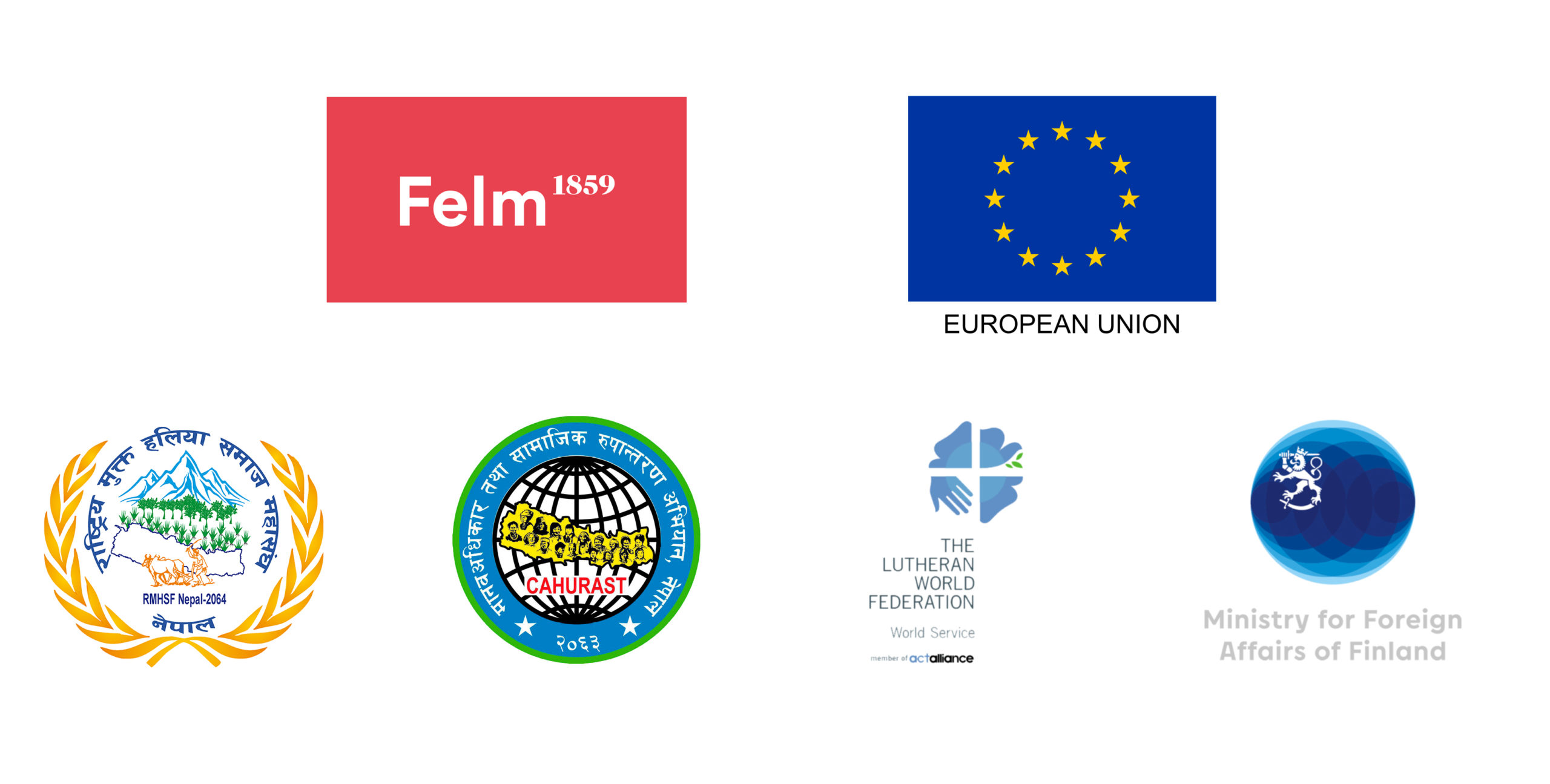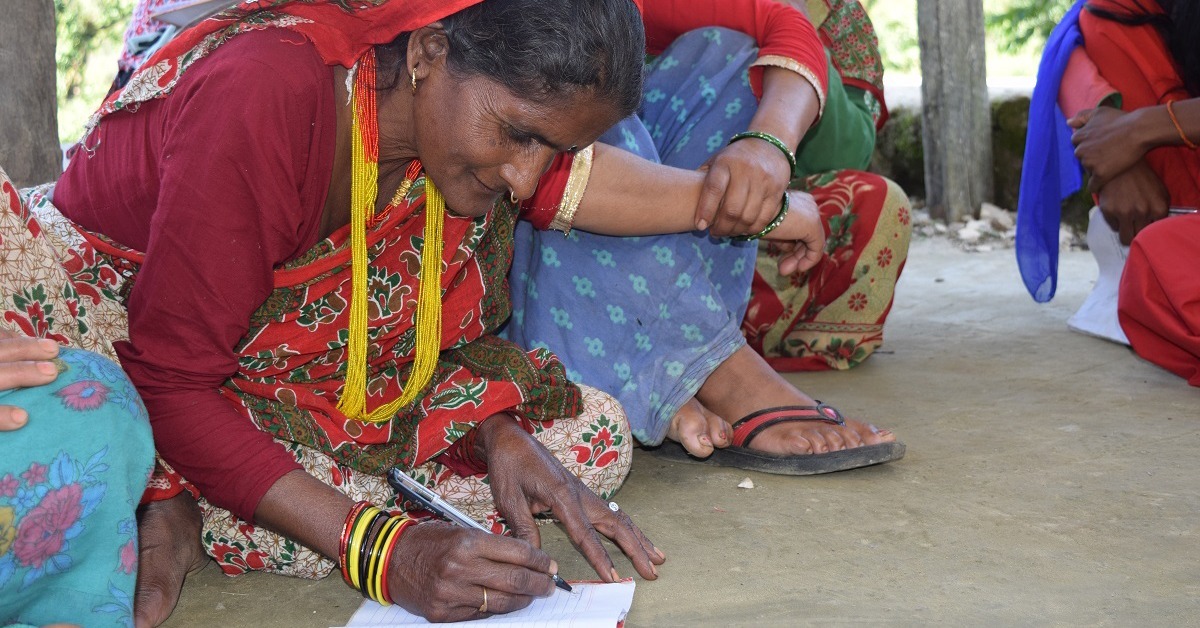Imagine having to face discrimination everywhere you go: drinking water taps, public schools, and hospitals. This is the reality for Haliyas, Nepal’s freed bonded laborers, and particularly Haliya women – only because they are Dalits, so called low-caste people.
According to a 2019 survey conducted by three organizations; Lutheran World Federation (LWF) Nepal, Campaign for Human Rights and Social Transformation Nepal (CAHURAST), and Rastriya Mukta Haliya Samaj Federation Nepal (RMHSF), 33% of freed Haliyas are witnessing discrimination in health service centers, and 89% at drinking water sources.
On top of this, Haliya women face multiple burden of discrimination, since they are not only discriminated because of their background, but because of their gender as well, in many ways.
Early child marriage still exists rampantly in Haliya communities, which has made Haliya women more vulnerable in terms of reproductive and maternal health. Haliya women are deprived from property rights because the freed Haliya identity card are issued in the name of male members of the family. They are also too often are treated as second class family members because in rural areas of Nepal men are only considered as the heads of the family.
Normally in rural Nepal, women are confined to household chores for caring of their children and husbands. As of the survey mentioned above, literacy rate of Haliya women is only 56%, while the national average is 67.9%. School drop out of Haliya women is also high.
What do Haliya women need for a dignified life?
Furthermore, Haliya women do not get same wages for same work as men. They also encounter harassment and abuse in their workplaces. Haliya women are excluded from decision making at home, which further pushes them towards helplessness.
Other reason for their vulnerability in both household and community level is the compulsion to give birth to many children due to different forms of superstitious beliefs and the desire for sons.
Change needs to start from Haliya communities themselves because Nepali`s constitution gives them constitutional rights to be equal members of the society without any discrimination. The Haliya women need to be made aware on national constitutional provisions so that they can systematically claim their rights and entitlements.
Their leadership capacity needs to be strengthened for their meaningful participation at decision making level. They need to be provided vocational trainings, and their income generation skills need to be enhanced. Economic empowerment for Haliya women will build confidence for them to have a dignified life in the society.
How is project ADHICAR trying to tackle these challenges?
A consortium of four Nepali and European organisations are implementing a new European Union funded project in the farwestern parts of Nepal. The consortium includes RMHSF-N, LWF, CAHURAST, and Felm. With the support of the European Union, the consortium is partnering up to combat discrimination of freed Haliyas, particularly persons with disabilities and women, who face the double burden of discrimination.
The ADHICAR project aims to produce verified data about the economic, social and cultural rights situation of freed Haliyas. The project is launching a campaign to increase freed Haliyas’ and particularly Haliya women’s participation in local level decision making; such as community groups, cooperatives and community-based organizations.
The project is advocating to mainstream Haliya women in different government and public structures. It is also providing trainings, and women’s empowerment programs for freed Haliya women. Special consideration will be put for single women and women living with disabilities.
Written by Hari Singh Bohora (RMHSF), Sarita Chaulagain and Bal Krishna Chaudhary (LWF Nepal)
This blog has been produced with the financial assistance of the European Union. The contents of this text are the sole responsibility of the project partners and can in no way be taken to reflect the views of the European Union.
नेपालका हलिया महिलाले भोग्नुपरेका वहुआयामिक विभेद
पन्ना देवी, ७१, मुक्त हलिया महिला हुन् जो साक्षर हुन खोजिरहेकी छन् । (स्रोतः राष्ट्रिय मुक्त हलिया समाज फेडेरेशन नेपाल)
कल्पना गर्नुहोस कि तपाईलाई खानेपानीको धारा, पानी पधेरो, बिद्यालय, अस्पताल जस्ता स्थानहरुमा जाँदा भेदभाव वा अपहेलनाको शिकार हुनुहुन्छ भने कस्तो महशुस गर्नुहुन्छ? तर यस्ता भेदभाव नेपालको सुदुरपस्चिम भेगको पहाडी भागमा बसोबास गर्ने मुक्त हलिया, विशेष गरि हलिया महिलाको वास्तविकता हो किनकि उनीहरु समाजद्वारा निर्धारित तल्लो जात भनेर चिनिने दलित समुदायसंग सम्बन्धित छन् ।
लुथरन विश्व फेडरेसन नेपाल, काहुराष्ट नेपाल र हलिया महासंघद्वारा २०१९ मा गरिएको एक सर्वेक्षण अनुसार मुक्त हलिया मध्ये ३३ % हलियाले स्वास्थ्य संस्थामा बिभेद भोग्ने गरेका छन् भने ८९ % हलियाले खानेपानीको धारो, पानी पधेरो आदिमा बिभेद भोग्ने गरेका छन् ।
त्यसको साथसाथै, हलिया महिलाले आफु गरिब भएकोले मात्र नभई महिला भएकै कारण विभिन्न प्रकारका भेदभाव भोग्ने गरेका छन् । बाल बिबाह हलिया समुदायमा अझै पनि प्रचलित छ जसका कारण हलिया महिलाको प्रजन्नन तथा मातृ स्वास्थ्यलाई गम्भीर असर पुर्याएको छ । हलिया परिचय पत्र पुरुषका नाममा मात्र दिने परम्पराले गर्दा हलिया महिला सम्पतिको समान अधिकारबाट बन्चित छन् । त्यसै गरि ग्रामिण नेपालमा पुरुष मात्र घरको अभिभाबक हो भन्ने अन्धबिश्वासले हलिया महिलालाई दोस्रो दर्जाको नागरिक सरह व्यवहार गरिन्छ ।
सामान्यतया, ग्रामिण नेपालका महिलाहरु घरायसी काम जस्तै चुलोचौको, श्रीमान तथा छोराछोरीको हेरचाहमा सिमित छन् । माथि उल्लेखित सर्वेक्षण अनुसार, नेपालको महिलाको सरदर साक्षरता दर ६७.९% हुदाहुदै पनि हलिया महिलाको साक्षरता दर ५६% मात्र छ किनभने हलिया महिला बिद्यालयमा भर्ना भएता पनि पढाई छाड्न बाध्य छन् ।
हलिया महिलालाई मर्यादित जीवनको लागि के को आवश्यकता छ?
हलिया महिलाले पुरुष सरह काम गर्दा पनि पुरुषको तुलनामा कम ज्याला पाउछन् । त्यसका साथै, उनीहरु काम गर्ने स्थानमा उत्पीडन, अपहेलना तथा दुरुपयोगको शिकार पनि हुने गरेका छन्। हलिया महिलाहरुलाई निर्णय प्रक्रियामा प्रतिबन्ध लगाइन्छ जसका कारण उनीहरु झन् दयानीय अवस्थामा पुग्छन् ।
त्यसैगरि, रुढीवादी परम्परा र छोराको चाहनाका कारणले धेरै सन्तानहरु जन्माउनु पर्ने वाध्यताले गर्दा उनीहरुको घर तथा समुदायमा जोखिमपूर्ण अवस्था छ ।
नेपालको कानुनले हलियालाई अरु मानिस सरह (भेदभाव रहित) जीवन जिउने हक–अधिकार दिएको हुनाले हलिया समाजबाट नै परिवर्तन आवश्यक छ । हलिया महिलालाई राज्यका नीति र आधारभुत मानवअधिकारबारे जानकारी गराउन जरुरि छ किनभने उक्त जानकारी भए, उनीहरु आफ्नो हक अधिकारको लागि कानुनी रुपमा अगाडी बढ्न सक्छन् ।
उनीहरुको निर्णय प्रक्रियामा अर्थपूर्ण सहभागिताको लागि नेतृत्व क्षमतामा बृद्दि गर्नुपर्छ । उनीहरुलाई आयमूलक तालिमको व्यवस्था गरिनुपर्छ र रोजगार मुलक सिपको वृद्धि गर्नुपर्छ । आर्थिक सशक्तिकरणले हलिया महिलालाई समाजमा मर्यादित जीवन जिउन अभिप्रेरित गर्दछ ।
अधिकार परियोजनाले कसरी यी चुनौतीहरुको सामना गर्न प्रयास गरिरहेको छ?
चार ओटा नेपाली तथा युरोपका संस्थाहरुको कन्सोर्टियमले युरोपियन युनियनद्वारा आर्थिक सहयोग प्राप्त गरि नेपालको सुदुरपश्चिमका पहाडी भागहरुमा नयाँ परियोजनामा काम गरिरहेका छ । त्यसमा लुथरन विश्व फेडरेसन नेपाल, काहुराष्ट नेपाल, हलिया महासंघ र फेल्म पर्छन ।
युरोपियन युनियनको सहयोगमा यो परियोजनाले मुक्त हलिया समाज (विशेष गरि जसले दोहोरो, तेहेरो भेदभाव महसुस गर्ने गरेका छन्, जस्तैः महिला हलिया, अपाङ्गता भएको हलिया) लाई भेदभावसंग लडेर अगाडी बढ्न प्रेरित गरेको छ ।
अधिकार परियोजनाले मुक्त हलियाको आर्थिक, सामाजिक र सांस्कृतिक अबस्थाको प्रमाणित तथ्य राख्ने लक्ष्य राखेको छ । यसले मुक्त हलियालाई स्थानिय तह (जस्तैः समूह, सहकारी तथा समुदायमा आधारित संस्था, आदि) मा निर्णायक भूमिका बृद्दि गर्न अभियान चलाएको छ ।
अधिकार परियोजनाले हलिया महिलालाई विभिन्न सरकारी तथा सार्बजनिक तहको मुलधारमा ल्याउन आवाज उठाईरहेको छ । यसले विभिन्न किसिमका आयमुलक तालिम, महिला शसक्तिकरणका कार्यक्रमहरु पनि संचालन गरिरहेको छ जसमा एकल महिला तथा अपाङ्गता भएका महिलालाई विशेष प्राथमिकता दिईन्छ ।
यो ब्लग बनाउन युरोपियन युनियन ले आर्थिक सहायता गरेको छ । यस लिखित सामाग्रीमा समावेस गरिएका सामाग्री/धारणा पूर्णरुपमा परियोजनाको साझेदारका हुन् र युरोपियन युनियनले यसको जिम्मेबारी लिदैन ।
लेखकः हरि सिंह बोहोरा (हलिया महासंघ), सरिता चौलागाईं र बाल कृष्ण चौधरी (एल डब्लु यफ, नेपाल)


